Abstract
Recognition of psychological distress in patients with cancer, some of which can be ameliorated with appropriate intervention, is a crucial aspect of patient care. Previous studies, with the exception of one, indicate that oncologists often fail to detect general distress and do not identify those patients with significant psychological disorder. As approximately 25-30% of patients experience anxiety and/or depression severe enough to merit psychological intervention, this is a serious problem. This study assessed the ability of five oncologists to recognise distress in newly referred out-patients who were receiving bad news. Self-report measures of the oncologists' satisfaction with their performance during the bad news interviews were also collected. Each patient had two clinical interviews in which information concerning diagnosis and treatment were given. Prior to each interview patients reported their own levels of distress by completing two self-report questionnaires. These were correlated with the ratings of distress and satisfaction made by each clinician on a visual analogue scale after each interview. Only one oncologist's ratings consistently correlated with patients' self-reported scores. The clinicians tended to under-rate the distress in their patients and were mostly satisfied with their performances during each interview. The ability to detect distress varied between each clinician and confirmed the conclusions of past studies that oncologists would benefit from up-grading their psychological assessment skills.
This is a preview of subscription content, access via your institution
Access options
Subscribe to this journal
Receive 24 print issues and online access
$259.00 per year
only $10.79 per issue
Buy this article
- Purchase on Springer Link
- Instant access to full article PDF
Prices may be subject to local taxes which are calculated during checkout
Similar content being viewed by others
Author information
Authors and Affiliations
Rights and permissions
About this article
Cite this article
Ford, S., Fallowfield, L. & Lewis, S. Can oncologists detect distress in their out-patients and how satisfied are they with their performance during bad news consultations?. Br J Cancer 70, 767–770 (1994). https://doi.org/10.1038/bjc.1994.393
Issue Date:
DOI: https://doi.org/10.1038/bjc.1994.393
This article is cited by
-
Cancer patients’ experiences and preferences when receiving bad news: a qualitative study
Journal of Cancer Research and Clinical Oncology (2023)
-
The significance of the distinction between “having a life” vs. “being alive” in end-of-life care
Medicine, Health Care and Philosophy (2022)
-
Overcoming therapeutic nihilism. Breaking bad news of amyotrophic lateral sclerosis—a patient-centred perspective in rare diseases
Neurological Sciences (2022)
-
How are emotional distress and reassurance expressed in medical consultations for people with long-term conditions who were unable to receive curative treatment? A pilot observational study with huntington’s disease and prostate cancer
Pilot and Feasibility Studies (2021)
-
Desire for Information in the Elderly: Interactions with Patients, Family, and Physicians
Journal of Cancer Education (2015)



